Consumer Complaints Management Policy and Procedure
Consumer Complaints Management Policy and Procedure
Consumer Complaints Management Policy and Procedure
Create successful ePaper yourself
Turn your PDF publications into a flip-book with our unique Google optimized e-Paper software.
Disability Services Commission<br />
<strong>Consumer</strong> <strong>Complaints</strong> <strong>Management</strong><br />
<strong>Policy</strong> <strong>and</strong> <strong>Procedure</strong><br />
December 2011<br />
<strong>Consumer</strong> <strong>Complaints</strong> <strong>Management</strong> <strong>Policy</strong> <strong>and</strong> <strong>Procedure</strong> December 2011
Table of Contents<br />
Page No.<br />
Part 1 - <strong>Consumer</strong> <strong>Complaints</strong> <strong>Policy</strong> 2<br />
Part 2 - <strong>Consumer</strong> <strong>Complaints</strong> <strong>Procedure</strong><br />
1 Introduction 6<br />
2 Complaint definition 6<br />
3 <strong>Complaints</strong> management stages 8<br />
4 Procedural fairness 14<br />
5 Staff support 14<br />
6 Confidentiality 14<br />
7 Documentation of complaints 15<br />
8 <strong>Complaints</strong> about disability sector organisations 15<br />
9 Brochures 15<br />
Appendices<br />
Appendix 1 - <strong>Consumer</strong> Complaint Data Form 17<br />
Appendix 2 - Sample complaint report 19<br />
Appendix 3 - Sample paragraph for complaint response re<br />
review <strong>and</strong> external independent help 20<br />
Appendix 4 - Complaint action plan/record 21<br />
Appendix 5 - Summary of staff roles in complaint management 22<br />
Appendix 6 - <strong>Consumer</strong> Liaison Service – contact list 24<br />
Appendix 7 - Performance st<strong>and</strong>ards 26<br />
Appendix 8 - <strong>Complaints</strong> <strong>Management</strong> St<strong>and</strong>ards 28<br />
Appendix 9 - The Western Australian Carers Charter <strong>and</strong> meaning of ‘carer’ 29<br />
<strong>Consumer</strong> <strong>Complaints</strong> <strong>Management</strong> <strong>Policy</strong> <strong>and</strong> <strong>Procedure</strong> December 2011 1
Disability Services Commission<br />
Part 1: <strong>Consumer</strong> <strong>Complaints</strong> <strong>Policy</strong><br />
2011<br />
1. Keywords<br />
<strong>Consumer</strong>, complaint, dissatisfaction, concerns, <strong>Consumer</strong> Liaison Service, people with<br />
disability, carer, advocate<br />
2. <strong>Policy</strong> statement<br />
The Disability Services Commission recognises <strong>and</strong> promotes the right of people with disability,<br />
their families, carers 1 <strong>and</strong>/or advocates to raise <strong>and</strong> discuss their concerns regarding the<br />
provision of services by the Commission.<br />
People with disability, their families, carers <strong>and</strong>/or advocates may feel vulnerable when making<br />
a complaint <strong>and</strong> negotiating a resolution. This feeling of vulnerability can be compounded for<br />
people from Aboriginal <strong>and</strong> culturally <strong>and</strong> linguistically diverse (CaLD) backgrounds. The<br />
principles of this policy are written within this context.<br />
The policy, which is outlined below, is in keeping with the Disability Services Act (1993), the<br />
Disability Services St<strong>and</strong>ards <strong>and</strong> the Carers Recognition Act 2004.<br />
3. Principles<br />
Principle 1:<br />
People with disability, their families, carers <strong>and</strong>/or advocates have the right to raise any<br />
complaints or concerns regarding any matter related to services provided by Commission<br />
staff, <strong>and</strong> to have their concerns investigated <strong>and</strong> resolved fairly <strong>and</strong> quickly.<br />
Principle 2:<br />
People with disability, their families, carers <strong>and</strong>/or advocates raising a complaint should<br />
be able to express their concerns <strong>and</strong> feel reassured that there will be no retribution.<br />
Principle 3:<br />
People with disability, their families, carers <strong>and</strong>/or advocates wishing to raise a complaint<br />
can do so at any level in the organisation. However it is generally preferable to resolve<br />
complaints at the level at which they occur, if possible.<br />
Principle 4:<br />
People with disability, their families, carers <strong>and</strong>/or advocates have the right to be<br />
informed about the internal <strong>and</strong> external avenues open to them to raise their concerns,<br />
<strong>and</strong> how their complaint will be h<strong>and</strong>led by the Commission.<br />
1 Carers are usually family members (but they may be a friend or neighbour) who provide<br />
ongoing support <strong>and</strong> assistance to a person, who may be a child or adult, who has a disability, a<br />
chronic illness, a mental illness or is frail <strong>and</strong> requires assistance with daily activities. See<br />
Appendix 9.<br />
<strong>Consumer</strong> <strong>Complaints</strong> <strong>Management</strong> <strong>Policy</strong> <strong>and</strong> <strong>Procedure</strong> December 2011 2
Principle 5:<br />
The complaints process will be consumer oriented, culturally secure, accessible, timely,<br />
efficient, confidential <strong>and</strong> not encumbered by bureaucratic ‘red tape’.<br />
Principle 6:<br />
The principles of natural justice must be followed for all parties involved in a complaint.<br />
Principle 7:<br />
People have the right to have a friend or advocate support them in raising their concerns.<br />
Principle 8:<br />
Complaint h<strong>and</strong>ling should, whenever possible, focus upon improving services for people<br />
with disability.<br />
4. Definitions<br />
Complaint<br />
A complaint is an expression of dissatisfaction with any aspect of Commission-provided<br />
services made by people with disability, their families, carers <strong>and</strong>/or advocates that is not typical<br />
of regular communication or feedback about services. From the viewpoint of the complainant,<br />
the involvement of management staff is required to achieve a satisfactory resolution to the<br />
concern raised.<br />
<strong>Consumer</strong><br />
In the context of this policy the term consumer is used to refer to the following:<br />
• a person with disability who has applied for or is receiving a service provided by the<br />
Commission<br />
• a carer, relative or advocate of a person with disability who has applied for or is receiving<br />
a service provided by the Commission.<br />
Resolution<br />
A complaint or dispute is ‘resolved’ when it is settled or concluded, <strong>and</strong> each of the parties is<br />
notified of the outcome. ‘Resolved’ does not necessarily mean that the complaint or dispute is<br />
concluded in favour of any of the parties.<br />
5. Background<br />
This policy directs the Commission’s consumer complaints service. It was established in May<br />
1994 as a requirement of the principles <strong>and</strong> objectives in the Disability Services Act (1993) <strong>and</strong><br />
the National Disability Services St<strong>and</strong>ards. It was reviewed <strong>and</strong>/or updated in consultation with<br />
relevant internal <strong>and</strong> external stakeholders in 2002, 2006, 2007, 2009 <strong>and</strong> 2011.<br />
<strong>Consumer</strong> <strong>Complaints</strong> <strong>Management</strong> <strong>Policy</strong> <strong>and</strong> <strong>Procedure</strong> December 2011 3
6. Implementation<br />
Executive Directors are responsible for ensuring the principles of this <strong>Policy</strong> <strong>and</strong> the associated<br />
<strong>Complaints</strong> <strong>Procedure</strong> are observed in their directorate. The procedures, in Part 2 of this<br />
document, are based on the following guidelines:<br />
• complaints will be acknowledged within 24 working hours<br />
• complaints will be responded to within 10-15 working days<br />
• records will be kept of all complaints raised, contacts with complainants, action taken <strong>and</strong><br />
outcomes reached<br />
• complaint documentation will be made available to complainants on request (except that<br />
which may violate the confidentiality of other consumers) <strong>and</strong> this should be kept in mind<br />
when records are made<br />
• confidentiality will be maintained at all times, <strong>and</strong> complaints will only be discussed with<br />
staff on a ‘need to know’ basis<br />
• if the complaint involves alleged misconduct by Commission staff (including volunteers)<br />
the Operational <strong>Procedure</strong>s for Managing a Suspected Breach of Discipline will be<br />
followed<br />
• any complaint involving an illegal action will be referred to the appropriate authority<br />
• a staff member against whom an allegation is made will be given the opportunity to have<br />
their say. In the event that the allegation is unsubstantiated, any record will be removed<br />
from their personal file<br />
• all staff will be informed of <strong>and</strong> familiar with the <strong>Consumer</strong> <strong>Complaints</strong> <strong>Policy</strong>.<br />
7. Funding or resource implications<br />
Currently funded program.<br />
8. Related policies, legislation <strong>and</strong> st<strong>and</strong>ards<br />
• Disability Services Act (1993)<br />
• Disability Services St<strong>and</strong>ard 7 - <strong>Complaints</strong> <strong>and</strong> Disputes<br />
• Complaint H<strong>and</strong>ling Australian St<strong>and</strong>ard AS ISO 10002-2006<br />
• Access for Aboriginal <strong>and</strong> Torres Strait Isl<strong>and</strong>er people with disabilities <strong>Policy</strong> <strong>and</strong> Practice<br />
Plan April 2006<br />
• The Western Australian Language Services <strong>Policy</strong> 2008<br />
• Substantive Equality Statement of Commitment for People with Disabilities February 2006;<br />
• Reconciliation Action Plan 2010-2012<br />
• <strong>Policy</strong>, Guidelines <strong>and</strong> Operational <strong>Procedure</strong>s For Managing Suspected Breaches of<br />
Discipline - May 2006<br />
• Carers Recognition Act 2004.<br />
<strong>Consumer</strong> <strong>Complaints</strong> <strong>Management</strong> <strong>Policy</strong> <strong>and</strong> <strong>Procedure</strong> December 2011 4
9. Communication<br />
This policy is available on the Commission’s intranet <strong>and</strong> website. Information brochures about<br />
the complaint process are provided to new consumers by Local Area Coordinators <strong>and</strong> the<br />
Eligibility Coordinator. Information brochures are available on the Commission’s website in<br />
English <strong>and</strong> other languages. Additional languages <strong>and</strong> formats can be provided on request.<br />
Articles about how to raise concerns are regularly published in Commission newsletters to<br />
consumers.<br />
10. Training<br />
The <strong>Consumer</strong> Liaison Officer trains the Local <strong>Consumer</strong> Liaison Officers <strong>and</strong> provides briefings<br />
to each directorate annually.<br />
11. Evaluation <strong>and</strong> review<br />
This policy is evaluated according to the st<strong>and</strong>ard Director General policy review mechanism.<br />
This policy replaces the <strong>Consumer</strong> <strong>Complaints</strong> <strong>Management</strong> <strong>Policy</strong> <strong>and</strong> <strong>Procedure</strong> - May 2009.<br />
Officer responsible: Director General, Disability Services Commission<br />
Author:<br />
Fran Tyler<br />
Date: December 2011<br />
<strong>Consumer</strong> <strong>Complaints</strong> <strong>Management</strong> <strong>Policy</strong> <strong>and</strong> <strong>Procedure</strong> December 2011 5
Disability Services Commission<br />
Part 2: <strong>Consumer</strong> <strong>Complaints</strong> <strong>Procedure</strong><br />
2011<br />
1. Introduction<br />
The Disability Services Commission is committed to the protection of rights of people with<br />
disability <strong>and</strong> the promotion of quality services.<br />
The Commission welcomes feedback from people with disability, their families, carers <strong>and</strong>/or<br />
advocates about any concerns they may have. Feedback enables us to correct any problems<br />
with our service, improve our relationship with our consumers <strong>and</strong> improve the overall quality of<br />
our services.<br />
The Commission encourages staff members providing direct client services to actively resolve<br />
any consumer concerns they encounter in the first instance. This approach reduces the need for<br />
people with disability, their families, carers <strong>and</strong>/or advocates to lodge a formal complaint.<br />
Staff need to be aware that, for people from Aboriginal <strong>and</strong> CaLD backgrounds, cultural <strong>and</strong><br />
language factors may affect how comfortable they feel to participate in a complaints process.<br />
Therefore additional culturally appropriate support may be required.<br />
The procedures outlined below are to assist staff to respond promptly, effectively <strong>and</strong> consistently<br />
to feedback received from people with disability, their families, carers <strong>and</strong>/or advocates.<br />
2. Complaint definition<br />
2.1 A complaint is an expression of dissatisfaction with any aspect of Commission-provided<br />
services made by people with disability, their families, carers <strong>and</strong>/or advocates that is not typical<br />
of regular communication or feedback about services. From the viewpoint of the complainant,<br />
the involvement of management staff is required to achieve a satisfactory resolution to the<br />
concern raised.<br />
2.2 A complaint is additionally classified as serious when:<br />
• it may result in a legal action – civil, criminal, or an administrative action such as a<br />
disciplinary hearing<br />
• there is an allegation of physical, sexual, or emotional abuse or neglect of a client by<br />
a Commission employee<br />
• the action of a staff member or another client may have resulted in death or serious<br />
injury of the complainant<br />
• any action taken by a staff member is outside the Public Service Guidelines, the<br />
Commission’s st<strong>and</strong>ards, code of conduct/ethics for the specific profession(s)<br />
• a complaint may have an impact on the Commission as a whole.<br />
Specific guidelines for h<strong>and</strong>ling serious complaints are outlined below in section 3.2.2.<br />
<strong>Consumer</strong> <strong>Complaints</strong> <strong>Management</strong> <strong>Policy</strong> <strong>and</strong> <strong>Procedure</strong> December 2011 6
2.3 2.3.1 Selection of complaints for investigation<br />
Where a complainant raises multiple issues of complaint, the Commission may elect to<br />
identify certain issues <strong>and</strong> investigate only those issues. The decision to limit the scope<br />
of a complaint investigation will be approved by the Director General <strong>and</strong> the complainant<br />
must be advised in writing of the decision <strong>and</strong> the reasons for that decision. Reasons for<br />
not taking up a particular complaint issue may include, but are not limited to, the<br />
following:<br />
• the issue has been investigated or dealt with previously<br />
• the issue is unsubstantiated or unverifiable<br />
• the issue is not current <strong>and</strong> occurred more than two years ago<br />
• the issue is vexatious.<br />
2.3.2 Prioritisation of issues for complaint investigation<br />
Where there are multiple issues of complaint that are reasonable to investigate, the<br />
Commission may elect to address the issues in a particular order, rather than investigate<br />
all issues concurrently. The decision to do so will usually be based on the availability of<br />
resources <strong>and</strong> the need to ensure that ongoing services are not disrupted.<br />
<strong>Consumer</strong> <strong>Complaints</strong> <strong>Management</strong> <strong>Policy</strong> <strong>and</strong> <strong>Procedure</strong> December 2011 7
3. <strong>Complaints</strong> management stages<br />
The three stages of the Commission’s complaints management process are summarised in the<br />
diagram below. Staff need to ensure that a complaint is not subject to more than one internal<br />
review, as it tends to deter the complainant <strong>and</strong> does not produce consumer satisfaction.<br />
<strong>Procedure</strong>s for h<strong>and</strong>ling consumer complaints follow.<br />
Stage 1<br />
↓<br />
Pre-grievance<br />
<strong>Consumer</strong> feedback - resolved by staff providing direct consumer services<br />
↓<br />
Stage 2<br />
↓<br />
Formal complaint - internal process<br />
Tier 1<br />
St<strong>and</strong>ard complaint h<strong>and</strong>ling<br />
• Complaint coordinators resolve complaints wherever possible at first<br />
contact<br />
• Complaint coordinators log complaint details <strong>and</strong> forward to <strong>Consumer</strong><br />
Liaison Officer for entry on database <strong>and</strong> later analysis<br />
Tier 2<br />
Internal review or investigation<br />
• Director General or a nominee, Executive Director or <strong>Consumer</strong><br />
Liaison Officer reviews/investigates unresolved complaints<br />
↓<br />
Stage 3<br />
↓<br />
Tier 3<br />
External independent review<br />
Unresolved complaints are referred to an appropriate external avenue such<br />
as the Health <strong>and</strong> Disability Services <strong>Complaints</strong> Office or the Ombudsman.<br />
<strong>Consumer</strong> <strong>Complaints</strong> <strong>Management</strong> <strong>Policy</strong> <strong>and</strong> <strong>Procedure</strong> December 2011 8
Staff procedures for h<strong>and</strong>ling consumer complaints<br />
3.1 Stage 1: Pre-grievance<br />
<strong>Consumer</strong> feedback – concerns resolved directly with staff<br />
<strong>Consumer</strong>s are encouraged to discuss any concerns or dissatisfaction they may have<br />
directly with the staff member who provides the service before lodging a formal<br />
complaint. Within the Accommodation area, this sometimes may involve the local area<br />
supervisor.<br />
Staff should do what they can to try to resolve the concerns. In most cases staff can deal<br />
with the concerns of consumers promptly <strong>and</strong> successfully within the existing service<br />
relationship, or through discussion with relevant staff. In such cases, it is not necessary<br />
to define the consumer’s concern as a complaint.<br />
<strong>Consumer</strong>s who have been unable to have their concerns resolved during this stage may<br />
wish to lodge a formal complaint. The staff member should advise them of their right to<br />
raise a formal complaint <strong>and</strong> should refer them immediately to the relevant manager or<br />
the <strong>Consumer</strong> Liaison Officer if they do wish to pursue the matter further.<br />
Note: The consumer complaint data form is not required at the pre-grievance stage.<br />
<strong>Consumer</strong> <strong>Complaints</strong> <strong>Management</strong> <strong>Policy</strong> <strong>and</strong> <strong>Procedure</strong> December 2011 9
3.2 Stage 2: Formal complaint – internal process<br />
3.2.1 St<strong>and</strong>ard complaint h<strong>and</strong>ling<br />
1. Preliminary assessment of a complaint<br />
1.1 Is the complaint within DSC’s No<br />
jurisdiction?<br />
Redirect to appropriate agency or redirect to CLO<br />
for advice.<br />
Yes<br />
go to 1.2<br />
1.2 Is the complaint within the staff<br />
member’s area of<br />
responsibility? Note that<br />
serious complaints - see 2.2<br />
<strong>and</strong> 3.22 – should be referred<br />
to the appropriate Executive<br />
Director)<br />
1.3 Is the complainant the client<br />
affected or an interested party<br />
(ie. family member, carer,<br />
friend, advocate or<br />
organisation)?<br />
1.4 Is the complaint sufficiently<br />
clear with respect to the nature<br />
of the complaint <strong>and</strong> the<br />
solutions sought? Document<br />
complaint issues <strong>and</strong> ask<br />
complainant to sign; provide<br />
copy to complainant.<br />
1.5 Has the complainant been<br />
advised how the matter will be<br />
followed up, any limitations to<br />
providing the solutions sought,<br />
<strong>and</strong> the expected timeframes<br />
for providing feedback <strong>and</strong><br />
resolving the complaint?<br />
1.6 Does the complainant<br />
underst<strong>and</strong> the complaint<br />
process?<br />
No<br />
Take the complainant’s contact details.<br />
Immediately refer to the appropriate line manager,<br />
or the CLO. Inform the complainant of name of<br />
staff member who will contact them.<br />
Yes<br />
go to 1.3<br />
No<br />
Establish if complainant has appropriate authority<br />
to lodge the complaint. Seek advice from the CLO<br />
if necessary.<br />
Yes<br />
go to 1.4<br />
No<br />
Further clarification with complainant as necessary.<br />
Is additional assistance required for cultural or<br />
language reasons? Obtain appropriate support.<br />
Clarify <strong>and</strong> document.<br />
(Appendix 2: Complaint report)<br />
Yes<br />
go to 1.5<br />
No<br />
Clarify with complainant. Is additional assistance<br />
required for cultural or language reasons? Obtain<br />
appropriate support.<br />
Yes<br />
go to 1.6<br />
No<br />
Clarify with complainant. Is additional assistance<br />
required for cultural or language reasons? Arrange<br />
accordingly. Ensure the complainant has a copy of<br />
the <strong>Complaints</strong> <strong>Policy</strong> or knows how to access one.<br />
Yes<br />
<strong>Consumer</strong> <strong>Complaints</strong> <strong>Management</strong> <strong>Policy</strong> <strong>and</strong> <strong>Procedure</strong> December 2011 10
2. Responding to the complaint<br />
2.1 Initial acknowledgement of the complaint should be within 24 working hours.<br />
2.2 All complaint contact <strong>and</strong> actions should be documented (see Appendix 4: Complaint<br />
action plan/record), including the initial contact with the complainant acknowledging their<br />
complaint. You must also document the efforts made to contact the complainant, in the<br />
event that contact could not be made with the complainant in a timely fashion.<br />
2.3 The timeframe to respond will vary according to the complexity of the complaint. As a<br />
guide, 10-15 working days should be sufficient time to respond for most complaints. For<br />
longer complaints, keep the complainant informed of progress at least every 10 working<br />
days.<br />
2.4 Investigate the complaint, checking the evidence (written information, discussion with<br />
relevant staff) relating to each issue.<br />
2.5 Plan a response to address the complaint, seek senior management endorsement if<br />
necessary, <strong>and</strong> communicate proposed response to the complainant. Confirm response<br />
in writing if appropriate.<br />
2.6 If the complainant is not satisfied, consider whether any other actions may be taken to<br />
resolve the matter. Inform the complainant of their right to have their complaint reviewed<br />
by the <strong>Consumer</strong> Liaison Officer, <strong>and</strong> the Health <strong>and</strong> Disability Services <strong>Complaints</strong><br />
Office (refer to Appendix 3: Sample paragraph for complaint response).<br />
<strong>Consumer</strong> <strong>Complaints</strong> <strong>Management</strong> <strong>Policy</strong> <strong>and</strong> <strong>Procedure</strong> December 2011 11
3. Documentation<br />
3.1 Have you documented all details<br />
of the complaint, from initial<br />
contact to resolution?<br />
Yes<br />
No<br />
Document all information (see<br />
Appendices 2 <strong>and</strong> 4 for optional<br />
templates)<br />
3.2 Have you completed the<br />
<strong>Consumer</strong> Complaint Data<br />
Form?<br />
Yes<br />
No<br />
Complete Form<br />
3.3 Have you forwarded the<br />
completed <strong>Consumer</strong> Complaint<br />
Data Form with the complaint<br />
documentation to the <strong>Consumer</strong><br />
Liaison Officer?<br />
Yes<br />
No<br />
Send data form <strong>and</strong> documentation<br />
to <strong>Consumer</strong> Liaison Officer<br />
Note:<br />
‣ please forward all forms, at the end of each month, even if the complaint has not<br />
been finalised. All other documents can be forwarded to the <strong>Consumer</strong> Liaison<br />
Officer upon finalisation.<br />
‣ for confidentiality purposes, documents referring to a complaint ARE NOT kept on<br />
the client’s file. Make a note on the file, such as ‘a report is contained on the<br />
<strong>Consumer</strong> Liaison Officer’s restricted file’.<br />
3.2.2 Process for h<strong>and</strong>ling serious complaints<br />
Serious complaints are defined in section 2.2.<br />
• An Executive Director or a nominee h<strong>and</strong>les serious complaints.<br />
• Staff must refer to the appropriate Executive Director as soon as they recognise that<br />
the complaint falls into the serious category.<br />
• Documents <strong>and</strong> other evidence are placed in safe keeping as soon as the complaint<br />
is reported to the Executive Director.<br />
• The Executive Director may need to notify the Police or other relevant external<br />
bodies such as the Department for Child Protection, the Office of the Public<br />
Advocate, or a professional registration board.<br />
• Some serious complaints will require the Operational <strong>Procedure</strong>s for Managing a<br />
Suspected Breach of Discipline to be followed, rather than the consumer complaint<br />
procedures.<br />
• The Director General signs the response to the complainant.<br />
<strong>Consumer</strong> <strong>Complaints</strong> <strong>Management</strong> <strong>Policy</strong> <strong>and</strong> <strong>Procedure</strong> December 2011 12
3.2.3 Internal review of complaints<br />
<strong>Consumer</strong>s or carers should be offered an internal review if they are dissatisfied with the<br />
process used to h<strong>and</strong>le their complaint or if they are dissatisfied with the outcome.<br />
• Complaint reviews are h<strong>and</strong>led by relevant senior managers, Executive Directors, the<br />
Director General or the <strong>Consumer</strong> Liaison Officer.<br />
• The process is the same as for a st<strong>and</strong>ard complaint until the final resolution.<br />
• The complaint report <strong>and</strong> suggested resolution must be submitted to the Director<br />
General for approval <strong>and</strong> to the <strong>Consumer</strong> Liaison Officer to ensure that the<br />
Commission:<br />
(i) confines the complaint to a two tier internal review<br />
(ii) can be accountable for its internal h<strong>and</strong>ling of the complaint.<br />
• The Director General signs the response to the complainant.<br />
3.3 Stage 3: External independent review<br />
<strong>Complaints</strong> that are not able to be resolved using the Commission’s complaint processes<br />
should be referred to an appropriate external body.<br />
Health <strong>and</strong> Disability Services <strong>Complaints</strong> Office<br />
Under Part 6 of the Disability Services Act the Health <strong>and</strong> Disability Services <strong>Complaints</strong><br />
Office (HADSCO) may investigate complaints about disability services, including<br />
complaints about non-compliance with the Carers Charter. <strong>Complaints</strong> must be raised<br />
with the Health <strong>and</strong> Disability Services <strong>Complaints</strong> Office within two years of the<br />
incident/s occurring, unless there is a good reason for the delay.<br />
Ombudsman<br />
The Ombudsman h<strong>and</strong>les complaints about administrative matters involving State<br />
Government departments <strong>and</strong> statutory authorities. The Ombudsman also assists where<br />
a problem spans two or more government departments.<br />
<strong>Consumer</strong> <strong>Complaints</strong> <strong>Management</strong> <strong>Policy</strong> <strong>and</strong> <strong>Procedure</strong> December 2011 13
4. Procedural fairness<br />
In the resolution of any complaint, the concept of fair play must apply to both the complainant<br />
<strong>and</strong> the respondent. <strong>Procedure</strong>s <strong>and</strong> practices need to be applied flexibly <strong>and</strong> adjusted<br />
whenever necessary to suit each individual’s circumstances. Accordingly:<br />
• decision-makers must act fairly <strong>and</strong> without bias<br />
• those directly involved in the complaint should not act as decision-makers<br />
• all parties to the matter should have the opportunity to put their case forward <strong>and</strong> have all<br />
relevant arguments considered before a decision made<br />
• if a complainant uses abusive, obscene or threatening language towards a Commission<br />
employee, the employee may terminate a conversation or interview, usually after provision<br />
of a warning<br />
• all persons need to be informed of the basis of a decision, where that decision affects<br />
them.<br />
5. Staff support<br />
Line managers have responsibility to ensure that staff who are the subject of a complaint<br />
receive appropriate information <strong>and</strong> support. Staff have the right to have a support person<br />
present at any stage of the complaints resolution process. They may seek the support of a<br />
union representative if they are a member or any other person. Staff may also contact any of<br />
the Commission’s nominated support persons for support.<br />
Staff, who are the subject of a complaint, are entitled to provide a written response to the<br />
complaint coordinator outlining their perspective on the complaint issues.<br />
Staff must be advised of investigation progress (not details) <strong>and</strong> the final outcome.<br />
The Commission recognises that some complaints may initially focus on staff actions but<br />
eventually can reveal systemic or procedural difficulties needing attention. When investigation<br />
of the complaint does not identify any substantiated performance issues involving the staff<br />
member, no record of the complaint will be retained on the staff member’s personal file.<br />
6. Confidentiality<br />
Confidentiality will be maintained in relation to all aspects of the complaint, within reasonable<br />
bounds required to conduct an investigation <strong>and</strong> facilitate a resolution of the complaint.<br />
Information about the complaint should be made known to staff members on a ‘need to know’<br />
basis only.<br />
Complaint records will be stored by the <strong>Consumer</strong> Liaison Officer on confidential complaint files<br />
with restricted access, <strong>and</strong> should not be retained on any other client files.<br />
<strong>Consumer</strong> <strong>Complaints</strong> <strong>Management</strong> <strong>Policy</strong> <strong>and</strong> <strong>Procedure</strong> December 2011 14
7. Documentation of complaints<br />
(a)<br />
(b)<br />
(c)<br />
(d)<br />
All Stage 2 <strong>and</strong> Stage 3 complaints (including ministerials) must be recorded. For<br />
each complaint received, the complaint coordinator completes the Commission’s<br />
consumer complaint data form <strong>and</strong> forwards it to the <strong>Consumer</strong> Liaison Officer for central<br />
complaints data collation. (Note: the data form is available at Appendix 1 or on the<br />
intranet).<br />
All forms are to be forwarded at the end of each month. The <strong>Consumer</strong> Liaison Officer<br />
submits monthly reports to the Director General <strong>and</strong> Executive Directors on the number<br />
of complaints received, nature of complaint <strong>and</strong> outcome. The CLO will follow up with<br />
the complaint coordinator any open cases.<br />
To preserve client confidentiality, present <strong>and</strong> future, the term complaint should not be<br />
used on the main client file. ‘A report is contained on the <strong>Consumer</strong> Liaison Officer’s<br />
restricted file’ should be the only reference that goes onto a client’s main file.<br />
The complaint report <strong>and</strong> associated paperwork must be forwarded to the <strong>Consumer</strong><br />
Liaison Officer, who will arrange for Records to create a Restricted File for confidential<br />
storage of the complaint documentation.<br />
If the complaint coordinator has recommended some systems change or corrective<br />
action, appropriate steps should be taken to have these implemented. In some cases,<br />
the complaint coordinator may need to prepare a briefing paper or draft policy for<br />
presentation via the Executive Director to Corporate Executive.<br />
8. <strong>Complaints</strong> about disability sector organisations<br />
Where consumers report a complaint about a Commission-funded disability sector organisation:<br />
• staff should inform complainants that the Commission requires disability sector<br />
organisations to have consumer complaint procedures, <strong>and</strong> these should be followed<br />
• if the complaint cannot be resolved using the organisation’s complaints procedures, or if<br />
the consumer believes that an independent review is necessary, the complaints<br />
provisions in Part 6 of the Disability Services Act (1993) are available. The consumer<br />
contacts the Director of the Health <strong>and</strong> Disability Services <strong>Complaints</strong> Office <strong>and</strong> asks to<br />
make a complaint under the provisions of Part 6 of the Disability Services Act (1993).<br />
9. Brochures<br />
• Help us to help you – is a pamphlet which describes the complaints process<br />
• How to have your say – this booklet provides information on avenues for registering a<br />
complaint about any of the services provided to people with disability.<br />
The brochures may be available in or translated to other languages or accessible formats<br />
upon request to the <strong>Policy</strong> <strong>and</strong> Strategy Directorate.<br />
<strong>Consumer</strong> <strong>Complaints</strong> <strong>Management</strong> <strong>Policy</strong> <strong>and</strong> <strong>Procedure</strong> December 2011 15
Informing consumers about the complaint process<br />
• Local Area Coordinators provide the Commission’s consumer complaint<br />
brochures to new clients <strong>and</strong> discuss the complaints process within three months<br />
of the commencement of the service.<br />
• Line managers ensure that consumer complaint brochures are displayed <strong>and</strong><br />
available to consumers at Colin Street head office, Accommodation, Statewide<br />
Specialist Services <strong>and</strong> LAC offices.<br />
• LAC Regional Managers ensure that articles about consumer complaint<br />
processes are published at least annually in LAC newsletters.<br />
• The Senior Eligibility Coordinator mails the Commission’s consumer complaints<br />
pamphlets with the eligibility letter for new clients with an intellectual disability or<br />
autism spectrum disorder.<br />
• The <strong>Consumer</strong> Liaison Officer ensures that the consumer complaint brochures<br />
are available to consumers on the Commission’s website, <strong>and</strong> available to staff on<br />
the intranet.<br />
<strong>Consumer</strong> <strong>Complaints</strong> <strong>Management</strong> <strong>Policy</strong> <strong>and</strong> <strong>Procedure</strong> December 2011 16
<strong>Consumer</strong> Complaint Data Form<br />
Confidential – not to be placed on client file<br />
Part 1 – Complaint Details<br />
<strong>Consumer</strong><br />
Surname<br />
Address<br />
Given name<br />
Postcode D.O.B Gender Male Female<br />
Phone<br />
no.<br />
Home Other DSC<br />
File<br />
No.<br />
Complainant (i.e. person lodging the complaint, if different from above)<br />
Surname<br />
Given name<br />
Address<br />
Phone<br />
no.<br />
Home<br />
Other<br />
Relationship to consumer (please mark appropriate box):<br />
Parent<br />
Carer<br />
Other relative<br />
Guardian<br />
Advocate/Friend<br />
Member of public<br />
Organisation<br />
Postcode<br />
Complaint under Carers Recognition Act<br />
Yes<br />
No<br />
DSC Complaint Coordinator (i.e. the staff member managing the<br />
complaint)<br />
Name<br />
Phone<br />
Date complaint<br />
Date complaint<br />
received<br />
closed<br />
Complaint Area (please tick appropriate box)<br />
Local Area Coordination<br />
Statewide Specialist Services<br />
Accommodation<br />
Eligibility<br />
Other (please specify)<br />
<strong>Policy</strong> <strong>and</strong> Strategy<br />
Service Contracting &<br />
Development<br />
Community & Sector<br />
Development<br />
Corporate Services<br />
Brief description of complaint<br />
Please notify the CLO of any new complaints before the end of each month.<br />
<strong>Consumer</strong> <strong>Complaints</strong> <strong>Management</strong> <strong>Policy</strong> <strong>and</strong> <strong>Procedure</strong> December 2011 17
St<strong>and</strong>ard to which the complaint relates (please mark appropriate<br />
box/es)<br />
1. Service Access<br />
2. Individual Needs<br />
3. Decision Making & Choice 4. Privacy, Dignity &<br />
5. Participation & Integration Confidentiality<br />
7. <strong>Complaints</strong> & Disputes<br />
6. Valued Status<br />
8. Service <strong>Management</strong><br />
9. Protection of Human Rights & Freedom from Abuse & Neglect<br />
Classification of Complaint (please mark appropriate box/es)<br />
Funding policy<br />
Quality of service<br />
Resident conduct<br />
Other (please specify)<br />
Lack of resources<br />
Staff conduct<br />
Communication<br />
Service eligibility<br />
Co-resident conduct<br />
Part 2 – Outcome of Complaint<br />
Outcome (please mark appropriate box)<br />
What was the outcome from the point of view of the complainant?<br />
Resolved<br />
Withdrawn<br />
Partly resolved<br />
Referred to another complaint<br />
avenue<br />
Was the complainant satisfied with the h<strong>and</strong>ling of the complaint?<br />
Yes No Unknown<br />
Was the complainant satisfied with the outcome of the complaint?<br />
Yes No Unknown<br />
What was the remedy?<br />
Apology<br />
Discipline<br />
Referral<br />
Service modified<br />
Other (please specify):<br />
Apology-explanation<br />
Explanation<br />
Service increased<br />
Service withdrawn<br />
Unresolved<br />
Unknown<br />
Decision changed<br />
<strong>Policy</strong> changed<br />
Service improved<br />
System changed<br />
Give brief details of any service/system improvement resulting from this<br />
complaint:<br />
Complaint coordinated/resolved by (please mark appropriate box)<br />
Director General<br />
<strong>Consumer</strong> Liaison Officer<br />
Other staff member<br />
Local <strong>Consumer</strong> Liaison Officer<br />
Line <strong>Management</strong> (Supervisor,<br />
Coordinator, Manager, Executive<br />
Director)<br />
<strong>Consumer</strong> <strong>Complaints</strong> <strong>Management</strong> <strong>Policy</strong> <strong>and</strong> <strong>Procedure</strong> December 2011 18
For data analysis <strong>and</strong> confidentiality in record keeping, please return the completed Complaint<br />
Data Form <strong>and</strong> all associated complaint documents to:<br />
<strong>Consumer</strong> Liaison Officer<br />
2 nd Floor, 146-160 Colin St, West Perth 6005<br />
Email: clo@dsc.wa.gov.au Fax: 9226 2313 Phone: 9426 9244<br />
Please notify the CLO of any new complaints before the end of each month.<br />
Thank you for your assistance.<br />
<strong>Consumer</strong> <strong>Complaints</strong> <strong>Management</strong> <strong>Policy</strong> <strong>and</strong> <strong>Procedure</strong> December 2011 19
Appendix 2<br />
<strong>Consumer</strong> Liaison Service<br />
Sample complaint report<br />
Client:<br />
(Name, DSC File No., D.O.B. contact details)<br />
Complainant:<br />
(Name <strong>and</strong> contact details)<br />
Date:<br />
(Name of complainant) raised the following issues (eg. during a home visit, a telephone<br />
conversation) on_________________ with (name of complaint coordinator)<br />
Complaint Background:<br />
(brief description of client’s circumstances <strong>and</strong> situation leading to complaint)<br />
Complaint Issues:<br />
(list the issues in dot point)<br />
Solutions Sought:<br />
(in dot points list the solutions the complainant is seeking to each of the issues listed above)<br />
Investigation/Action Taken:<br />
(describe the actions taken to follow up the concerns)<br />
Outcome/Resolution:<br />
(briefly describe the outcome of the complaint <strong>and</strong> any improvements implemented as a<br />
result)<br />
__________________________________<br />
(Name of Complaint Coordinator)<br />
(insert date)<br />
<strong>Consumer</strong> <strong>Complaints</strong> <strong>Management</strong> <strong>Policy</strong> <strong>and</strong> <strong>Procedure</strong> December 2011 20
Appendix 3<br />
Sample paragraph for complaint response:<br />
review <strong>and</strong> external independent help<br />
All responses to the complainant must include the following information:<br />
In the event that you are not satisfied with the response to your complaint, you can ask the<br />
Commission’s <strong>Consumer</strong> Liaison Officer, to review the matter. The <strong>Consumer</strong> Liaison Officer<br />
can be contacted on 9426 9244 or at clo@dsc.wa.gov.au. Alternatively, if you wish to have<br />
your concerns examined by an independent <strong>and</strong> external agency, you may contact the<br />
Health <strong>and</strong> Disability Services <strong>Complaints</strong> Office (HaDSCO) on 9323 0600. I have enclosed<br />
a brochure for your information.<br />
<strong>Consumer</strong> <strong>Complaints</strong> <strong>Management</strong> <strong>Policy</strong> <strong>and</strong> <strong>Procedure</strong> December 2011 21
Appendix 4<br />
Complaint action plan/record<br />
A chronological record of contacts <strong>and</strong> actions planned <strong>and</strong>/or made during the investigation of<br />
a complaint. Reference should be made to File Notes for detailed information of the contacts.<br />
Client:_________________________________________________________________<br />
Complainant:___________________________________________________________<br />
Complaint Coordinator:_____________________________________________<br />
Date Time Contact/Action<br />
<strong>Consumer</strong> <strong>Complaints</strong> <strong>Management</strong> <strong>Policy</strong> <strong>and</strong> <strong>Procedure</strong> December 2011 22
Appendix 5<br />
Summary of staff roles in complaint management<br />
1. Direct service providers<br />
(a)<br />
(b)<br />
(c)<br />
(d)<br />
Knowledge of the Commission’s complaints management procedures, Local<br />
<strong>Consumer</strong> Liaison Officers, <strong>Consumer</strong> Liaison Officer <strong>and</strong> consumer complaints<br />
brochures.<br />
Endeavour to resolve any concerns raised at the direct service provision level<br />
utilising an interpreter or other culturally appropriate supports when necessary.<br />
Inform complainant of complaint resolution process, utilising an interpreter or other<br />
culturally appropriate supports when necessary, if concerns cannot be resolved at<br />
direct service provision level.<br />
Arrange for a Local <strong>Consumer</strong> Liaison Officer, other manager or the <strong>Consumer</strong><br />
Liaison Officer to contact consumers or carers who wish to pursue a formal<br />
complaint.<br />
2. Local <strong>Consumer</strong> Liaison Officers (LCLOs) <strong>and</strong> other line managers<br />
(Note: LCLOs are staff, usually managers, nominated by their Executive Director to<br />
h<strong>and</strong>le complaints at the local level).<br />
(a)<br />
(b)<br />
(c)<br />
(d)<br />
(e)<br />
Ensure consumer complaint pamphlets are displayed <strong>and</strong> available in a range of<br />
formats to consumers at service outlets.<br />
Ensure that consumers are provided with information about the consumer<br />
complaint process during periodic service plan reviews.<br />
H<strong>and</strong>le complaints raised by people with disability, their families, carers <strong>and</strong>/or<br />
advocates if their concerns are not resolved directly with staff who provide the<br />
service (note: line managers should not h<strong>and</strong>le complaints in which they may have<br />
a conflict of interest).<br />
Clarify <strong>and</strong> investigate complaints <strong>and</strong> make regular progress reports to the<br />
complainant until the matter is resolved.<br />
Record complaint on the <strong>Consumer</strong> Complaint Data Form <strong>and</strong> forward to the<br />
<strong>Consumer</strong> Liaison Officer (CLO) together with other complaint documentation for<br />
data collection <strong>and</strong> confidential document storage. (Note: the Data Form is<br />
available at Appendix 1 <strong>and</strong> on the intranet).<br />
3. Executive Director<br />
(a)<br />
(b)<br />
(c)<br />
(d)<br />
<strong>Management</strong> or delegation of serious complaints.<br />
Internal review of complaints when requested.<br />
Responsibility for quality, consistency <strong>and</strong> effectiveness of complaints<br />
management in region or directorate.<br />
Ensure data on all formal complaints is submitted to the <strong>Consumer</strong> Liaison Officer<br />
for central collation <strong>and</strong> confidential storage.<br />
<strong>Consumer</strong> <strong>Complaints</strong> <strong>Management</strong> <strong>Policy</strong> <strong>and</strong> <strong>Procedure</strong> December 2011 23
4. <strong>Consumer</strong> Liaison Officer (CLO)<br />
(a)<br />
(b)<br />
(c)<br />
(d)<br />
(e)<br />
(f)<br />
(g)<br />
(h)<br />
(i)<br />
Manages the <strong>Consumer</strong> Liaison Service.<br />
Acts as the Commission’s “neutral” arbitrator.<br />
Provides information <strong>and</strong> advice on internal <strong>and</strong> external complaints avenues.<br />
Reviews or investigates concerns which were raised by people with disability, their<br />
families, carers <strong>and</strong>/or advocates, <strong>and</strong> unsuccessfully resolved at the local level.<br />
Coordinates complaints which are not suitable for h<strong>and</strong>ling in a local area or<br />
Directorate.<br />
Provides monthly <strong>and</strong> annual reports about the number of complaints received,<br />
the nature of the complaint, the area <strong>and</strong> the outcome to the Director General <strong>and</strong><br />
Executive Directors of the area to which the complaints refer.<br />
Ensures the <strong>Consumer</strong> Liaison Service is effective <strong>and</strong> efficient by continuous<br />
review <strong>and</strong> monitoring.<br />
Provides advice <strong>and</strong> support to people with disability, their families, carers <strong>and</strong>/or<br />
advocates in relation to complaints.<br />
Provides advice, education on complaints process <strong>and</strong> h<strong>and</strong>ling, <strong>and</strong> support to<br />
Commission staff, <strong>and</strong> to disability sector organisations on request.<br />
5. Director General<br />
(a)<br />
(b)<br />
(c)<br />
Provides direction regarding complaints when necessary, including the limitation of<br />
the scope of a complaint (2.3.1.)<br />
May internally review complaints <strong>and</strong> h<strong>and</strong>le serious complaints.<br />
Signs complaints correspondence where appropriate, as assessed by the CLO.<br />
6. Local Area Coordinators (LACs)<br />
(a)<br />
(b)<br />
(c)<br />
LACs provide the Commission’s consumer complaint pamphlets to new clients<br />
within three months of the commencement of the service.<br />
LAC Area Managers ensure that consumer complaint pamphlets are displayed<br />
<strong>and</strong> available to consumers at LAC offices.<br />
LAC Regional Managers ensure that articles about consumer complaint processes<br />
are published at least annually in LAC newsletters.<br />
7. Eligibility Determination Coordinator<br />
The Senior Eligibility Coordinator mails the Commission’s consumer complaints<br />
pamphlets with eligibility letters.<br />
<strong>Consumer</strong> <strong>Complaints</strong> <strong>Management</strong> <strong>Policy</strong> <strong>and</strong> <strong>Procedure</strong> December 2011 24
Local <strong>Consumer</strong> Liaison Officers (LCLOs):<br />
Appendix 6<br />
<strong>Consumer</strong> Liaison Service - Contact List<br />
• Accommodation Services<br />
Area Position Telephone<br />
Area North Service Support Officer 9376 0422<br />
Area South Service Support Officer 9329 2411<br />
Area East Service Support Officer 6140 9832<br />
• Local Area Coordination<br />
Area Position Telephone<br />
Area North<br />
New North LAC Area Manager 9301 3781<br />
Mobile: 0457 509 582<br />
North West LAC Area Manager 9300 5962<br />
Mobile: 0419 989 711<br />
Central North LAC Area Manager 9440 5424<br />
Mobile: 0419 952 451<br />
Pilbara LAC Area Manager 9143 1750<br />
Mobile: 0429 089 569<br />
North East LAC Area Manager 9309 6739<br />
Mobile: 0409 680 622<br />
Midwest LAC Area Manager 9921 6423<br />
Mobile: 0428 960 582<br />
Goldfields LAC Area Manager 9082 8105<br />
Mobile: 0428 946 107<br />
Kimberley LAC Area Manager 9192 1144<br />
Mobile: 0419 968 249<br />
Kelmscott LAC Area Manager 9396 0601<br />
Mobile: 0417 919 439<br />
Hills LAC Area Manager 6140 9601<br />
Mobile: 0417 966 784<br />
Swan West LAC Area Manager 6466 4410<br />
Mobile: 0419 968 775<br />
Area South<br />
Coastal LAC Area Manager 9446 6785<br />
Mobile: 0418 934 231<br />
South Central LAC Area Manager 9259 2604<br />
Mobile: 0417 918 968<br />
Lower South West LAC Area Manager 9752 4282<br />
Mobile: 0417 181 769<br />
Fremantle LAC Area Manager 9331 4685<br />
Mobile: 0417 942 928<br />
Cockburn Kwinana LAC Area Manager 6399 7001<br />
Mobile: 0419 924 252<br />
Rockingham LAC Area Manager 9557 1001<br />
Mobile: 0434 325 657<br />
<strong>Consumer</strong> <strong>Complaints</strong> <strong>Management</strong> <strong>Policy</strong> <strong>and</strong> <strong>Procedure</strong> December 2011 25
Lower Great<br />
Southern<br />
LAC Area Manager 9845 5708<br />
Mobile: 0429 154 524<br />
Peel LAC Area Manager 9535 1112<br />
Mobile: 0417 987 389<br />
Central East LAC Area Manager 9493 4833<br />
Mobile: 0417 185 766<br />
Wheatbelt LAC Area Manager 9881 4985<br />
Mobile: 0434 604 183<br />
Upper South West LAC Area Manager 9722 3000<br />
Mobile: 0408 919 313<br />
• Statewide Specialist Services<br />
Area Position Telephone<br />
Area North<br />
Joondalup Office Regional Manager Metropolitan Specialist 9301 3789<br />
Joondalup Office<br />
Area South<br />
Myaree Office<br />
Myaree Office<br />
Services<br />
Regional Manager Metropolitan Specialist<br />
Services<br />
Regional Manager Metropolitan Specialist<br />
Services<br />
Regional Manager Metropolitan Specialist<br />
Services<br />
Mobile: 0423 844 118<br />
9301 3808<br />
Mobile: 0403 331 575<br />
9329 2402<br />
Mobile: 0419 963 691<br />
9329 2401<br />
Mobile: 0409 378 909<br />
West Perth Office<br />
Manager Statewide Resource <strong>and</strong><br />
Consultancy<br />
9426 9261<br />
• <strong>Consumer</strong> Liaison Officer (CLO):<br />
Area Position Telephone<br />
Head Office <strong>Consumer</strong> Liaison Officer 9426 9244<br />
<strong>Consumer</strong> <strong>Complaints</strong> <strong>Management</strong> <strong>Policy</strong> <strong>and</strong> <strong>Procedure</strong> December 2011 26
Appendix 7<br />
Performance st<strong>and</strong>ards<br />
These performance st<strong>and</strong>ards are designed to ensure that the Commission’s consumer<br />
complaints policy <strong>and</strong> procedures are implemented effectively, in line with the Australian<br />
St<strong>and</strong>ard Complaint H<strong>and</strong>ling AS ISO 10002-2006. They are:<br />
Performance St<strong>and</strong>ard<br />
1. People with disability, their<br />
families, carers <strong>and</strong>/or advocates<br />
are informed about the consumer<br />
complaints policy <strong>and</strong> procedures<br />
<strong>and</strong> their right to raise any<br />
concern or complaint regarding<br />
the services they receive from the<br />
Commission.<br />
2. People with disability, their<br />
families, carers <strong>and</strong>/or advocates<br />
are informed about external<br />
avenues of appeal.<br />
3. All staff are informed of <strong>and</strong><br />
familiar with the <strong>Consumer</strong><br />
<strong>Complaints</strong> <strong>Management</strong> <strong>Policy</strong><br />
<strong>and</strong> <strong>Procedure</strong>.<br />
4. All Local <strong>Consumer</strong> Liaison<br />
Officers are provided with training<br />
on the <strong>Consumer</strong> <strong>Complaints</strong><br />
<strong>Management</strong> <strong>Policy</strong> <strong>and</strong><br />
<strong>Procedure</strong>.<br />
Key Performance<br />
Indicator<br />
• articles published in<br />
disAbility update <strong>and</strong><br />
the LAC newsletter, at<br />
least twice a year;<br />
• brochures displayed at<br />
all the Commission’s<br />
offices;<br />
• eligibility determination<br />
coordinator provides all<br />
people assessed<br />
through eligibility<br />
determination with<br />
brochures;<br />
• policy, procedures <strong>and</strong><br />
brochures available on<br />
the Commission’s<br />
website.<br />
• as above<br />
• information about the<br />
Health <strong>and</strong> Disability<br />
Services <strong>Complaints</strong><br />
Office included in all<br />
correspondence (refer<br />
to Appendix 3)<br />
• directorates briefing<br />
sessions – one per<br />
year.<br />
• policy, procedures <strong>and</strong><br />
brochures available on<br />
the intranet <strong>and</strong><br />
internet.<br />
• training provided, as<br />
required.<br />
Target<br />
100%<br />
100%<br />
100%<br />
100%<br />
100%<br />
Responsible<br />
Officer<br />
<strong>Consumer</strong><br />
Liaison Officer<br />
Line Managers<br />
Senior Eligibility<br />
Coordinator<br />
<strong>Consumer</strong><br />
Liaison Officer<br />
100%<br />
100% Complaint<br />
coordinators<br />
100%<br />
100%<br />
100%<br />
<strong>Consumer</strong><br />
Liaison Officer<br />
<strong>Consumer</strong><br />
Liaison Officer<br />
<strong>Consumer</strong><br />
Liaison Officer<br />
100% <strong>Consumer</strong><br />
Liaison Officer<br />
<strong>Consumer</strong> <strong>Complaints</strong> <strong>Management</strong> <strong>Policy</strong> <strong>and</strong> <strong>Procedure</strong> December 2011 27
Performance St<strong>and</strong>ard<br />
Key Performance<br />
Indicator<br />
Target<br />
Responsible<br />
Officer<br />
5. The complaint coordinator<br />
acknowledges receipt of the<br />
complaint within 24 working<br />
hours, <strong>and</strong> documents contact<br />
with the complainant. The<br />
complaint coordinator also<br />
documents the effort made to<br />
contact the complainant, in the<br />
event that contact could not be<br />
made with the complainant on a<br />
timely basis.<br />
6. All complainants are informed of<br />
the outcome of their complaint<br />
within 10-15 working days, where<br />
possible<br />
7. All complaints are documented<br />
<strong>and</strong> forwarded to the <strong>Consumer</strong><br />
Liaison Officer.<br />
8. The <strong>Consumer</strong> Liaison Officer<br />
records all complaints in a<br />
confidential database.<br />
9. The <strong>Consumer</strong> Liaison Officer<br />
files each complaint on a<br />
restricted file.<br />
10. The <strong>Consumer</strong> Liaison Officer<br />
provides a monthly report to the<br />
Director General <strong>and</strong> the<br />
Executive Directors.<br />
11. The <strong>Consumer</strong> Liaison Officer<br />
provides an annual report to the<br />
Director General for inclusion in<br />
the Commission’s Annual Report,<br />
<strong>and</strong> a copy to all Executive<br />
Directors.<br />
12. Complainant’s satisfaction with<br />
the complaint h<strong>and</strong>ling process.<br />
13. The policy <strong>and</strong> procedures are<br />
reviewed every 2 years.<br />
• all contacts<br />
documented.<br />
• complaint resolved<br />
within timeframe;<br />
• complainants kept<br />
informed through the<br />
resolution process if<br />
timeframe longer.<br />
• all documents<br />
forwarded to the<br />
<strong>Consumer</strong> Liaison<br />
Officer.<br />
• all complaints recorded<br />
on database.<br />
• complaints filed on<br />
restricted file.<br />
• reports submitted on<br />
time.<br />
• report submitted on<br />
time.<br />
100% Complaint<br />
coordinators<br />
100%<br />
100%<br />
Complaint<br />
coordinators<br />
100% Complaint<br />
coordinators<br />
100% <strong>Consumer</strong><br />
Liaison Officer<br />
100% <strong>Consumer</strong><br />
Liaison Officer<br />
100% <strong>Consumer</strong><br />
Liaison Officer<br />
100% <strong>Consumer</strong><br />
Liaison Officer<br />
• satisfaction with<br />
process.<br />
85% Complaint<br />
coordinators<br />
• policy reviewed. 100% <strong>Consumer</strong><br />
Liaison Officer<br />
<strong>Consumer</strong> <strong>Complaints</strong> <strong>Management</strong> <strong>Policy</strong> <strong>and</strong> <strong>Procedure</strong> December 2011 28
Appendix 8<br />
<strong>Complaints</strong> <strong>Management</strong> St<strong>and</strong>ards<br />
1. The Commission is committed to the following complaint h<strong>and</strong>ling st<strong>and</strong>ards:<br />
• Complaint H<strong>and</strong>ling Australian St<strong>and</strong>ard AS ISO 10002-2006<br />
• Disability Services St<strong>and</strong>ards, St<strong>and</strong>ard 7: <strong>Complaints</strong> <strong>and</strong> Disputes<br />
2. <strong>Consumer</strong>s can expect the following specific st<strong>and</strong>ards, based on the Australian<br />
St<strong>and</strong>ard: AS ISO 10002-2006<br />
(a)<br />
(b)<br />
(c)<br />
(d)<br />
(e)<br />
(f)<br />
(g)<br />
(h)<br />
(i)<br />
(j)<br />
(k)<br />
Visibility. Information about how <strong>and</strong> where to complain is well publicised to<br />
consumers, carers, personnel <strong>and</strong> other interested parties.<br />
Accessibility. The complaints h<strong>and</strong>ling process is easily accessible to all<br />
complainants. This includes readily accessible information about the process,<br />
flexibility in the methods of making complaints <strong>and</strong> special arrangements <strong>and</strong>/or<br />
support for complainants with specific needs (including interpreters).<br />
Responsiveness. Receipt of each complaint is acknowledged to the complainant<br />
immediately. <strong>Complaints</strong> are addressed promptly, complainants are treated<br />
courteously <strong>and</strong> kept informed of the progress of their complaint through the<br />
complaints h<strong>and</strong>ling process.<br />
Objectivity. Each complainant is addressed in an equitable, objective <strong>and</strong><br />
unbiased manner through the complaints h<strong>and</strong>ling process.<br />
Charges. Access to the complaints h<strong>and</strong>ling process is free of charge to the<br />
complainant.<br />
Confidentiality. Personally identifiable information concerning the complainant is<br />
available where needed, but only for the purposes of addressing the complaint<br />
within the Commission <strong>and</strong> is actively protected from disclosure, unless the<br />
complainant expressly consents to its disclosure.<br />
Investigation of complaints. Every reasonable effort is made to investigate all<br />
the relevant circumstances <strong>and</strong> information surrounding the complaint.<br />
<strong>Consumer</strong>-focused approach. The Commission adopts a consumer-focused<br />
approach, is open to feedback including complaints, <strong>and</strong> shows commitment to<br />
resolving complaints by its actions.<br />
Resolution of complaint. Following an appropriate investigation, the Commission<br />
offers a response, for example, correct the problem <strong>and</strong> prevent it happening in<br />
the future. The decision or action taken regarding the complaint is communicated<br />
to the complainant as soon as the decision or action is taken.<br />
Accountability. The Commission ensures that accountability for <strong>and</strong> reporting on<br />
the actions <strong>and</strong> decisions of the organisation with respect to complaints h<strong>and</strong>ling<br />
is clearly established.<br />
Continual improvement. The continual improvement of the complaints h<strong>and</strong>ling<br />
process <strong>and</strong> the quality of services is a permanent objective of the Commission.<br />
<strong>Consumer</strong> <strong>Complaints</strong> <strong>Management</strong> <strong>Policy</strong> <strong>and</strong> <strong>Procedure</strong> December 2011 29
Appendix 9<br />
The Western Australian Carers Charter<br />
(Carers Recognition Act 2004 – Schedule 1)<br />
1. Carers must be treated with respect <strong>and</strong> dignity.<br />
2. The role of carers must be recognised by including carers in the assessment, planning,<br />
delivery <strong>and</strong> review of services that impact on them <strong>and</strong> the role of carers.<br />
3. The views <strong>and</strong> needs of carers must be taken into account along with the views, needs<br />
<strong>and</strong> best interests of people receiving care when decisions are made that impact on<br />
carers <strong>and</strong> the role of carers.<br />
4. <strong>Complaints</strong> made by carers in relation to services that impact on them <strong>and</strong> the role of<br />
carers must be given due attention <strong>and</strong> consideration.<br />
Meaning of “carer”<br />
Extract from Carers Recognition Act 2004<br />
(1) Except as provided in subsection (2), a person is a carer for the purposes of this Act if<br />
he or she is an individual who provides ongoing care or assistance to —<br />
(a) a person with a disability as defined in the Disability Services Act 1993 section 3;<br />
(b) a person who has a chronic illness, including a mental illness as defined in the<br />
Mental Health Act 1996 section 3;<br />
(c) a person who, because of frailty, requires assistance with carrying out everyday<br />
tasks; or<br />
(d) a person of a prescribed class.<br />
(2) However a person is not a carer if he or she —<br />
(a) provides the care or assistance under a contract for services (other than an<br />
agreement entered into under the Disability Services Act 1993 section 25) or a<br />
contract of service; or<br />
(b) provides the care or assistance while doing community work as defined in the<br />
Volunteers (Protection from Liability) Act 2002 section 3(1).<br />
(3) A person is not a carer for the purposes of this Act only because —<br />
(a) the person is a spouse, de facto partner, parent or guardian of the person to<br />
whom the care or assistance is being provided; or<br />
(b) the person provides care to a child under an arrangement with the chief<br />
executive officer of the department principally assisting the Minister<br />
administering the Child Welfare Act 1947 in the administration of that Act.<br />
<strong>Consumer</strong> <strong>Complaints</strong> <strong>Management</strong> <strong>Policy</strong> <strong>and</strong> <strong>Procedure</strong> December 2011 30


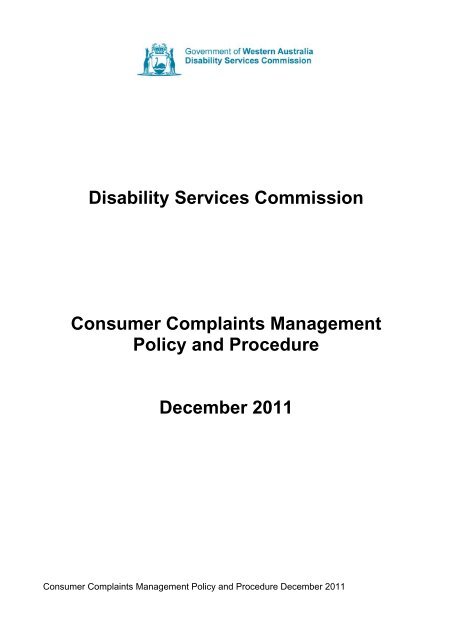

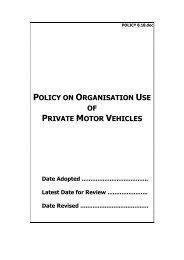
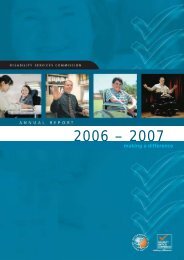

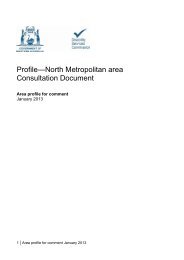
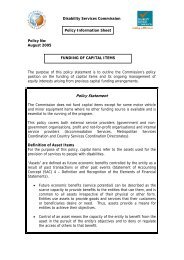
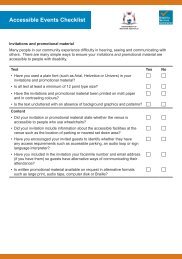
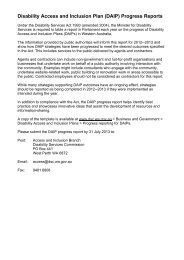
![Heerarka Adeegyada Naafada [PDF 102 kB] - Disability Services ...](https://img.yumpu.com/22096139/1/184x260/heerarka-adeegyada-naafada-pdf-102-kb-disability-services-.jpg?quality=85)

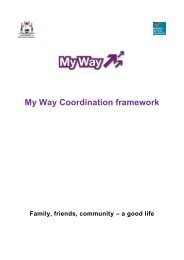

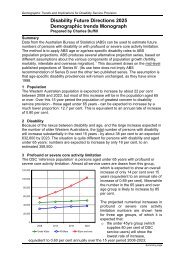
![معايير خدمات الإعاقة [PDF 297 kB] - Disability Services Commission](https://img.yumpu.com/22096120/1/184x260/-pdf-297-kb-disability-services-commission.jpg?quality=85)